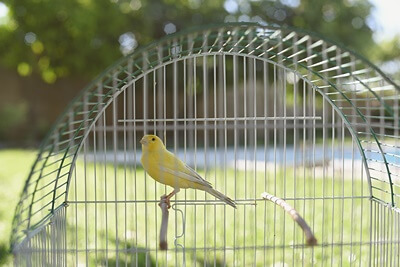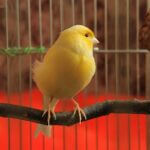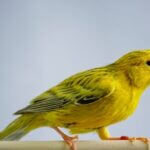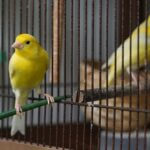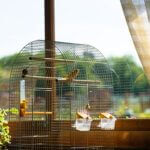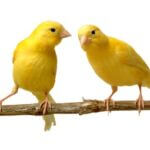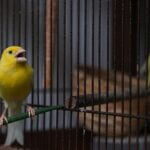Due to their impressive singing abilities, canaries are loved by breeders and pet owners alike. The best singing canaries have a melodic, high-pitched trill that fills the room with pleasant songs.
However, there’s a range of different canary breeds, and not all of them are capable of singing beautifully. Many first-time canary owners get songbirds only to be disappointed with their lack of singing.
Not all songbirds are even able to sing. If you want to own a canary capable of trilling for hours every day, you must choose one according to its breed, genetics, sex, and other key factors. Even the surroundings and care you provide the bird will impact its songs.
Among those breeds that can sing, certain breeds are better at singing than others.
How Do Canaries Sing?
Canaries sing by producing a high-pitched whistling sound. Until 2013, it was believed that they produced this sound from the larynx, but this wasn’t the case. It was found that their singing comes from the syrinx.
All animals that produce sound do so from the larynx, a special voice box that sits at the top of the throat. The vocal cords are located in the middle of the larynx, and when they vibrate, they produce sounds.
Canaries also have larynxes, but that’s not where their beautiful singing originates. They have a different voice box called the syrinx further down their throat, where the windpipe splits and connects to the lungs.
The larynx produces sound by working with muscles attached to the cartilage. However, the syrinx relies on muscles found on the back of the throat.
According to Nature, researchers theorize that the cartilage in birds’ larynx began migrating to form the syrinx over 60 million years back.
It’s believed that the syrinx took over the production of trilling in birds because it can produce a larger variety of sounds than the larynx.
What Kind of Canary is The Best Singer?
There are five canary breeds known for being the best singers, including:
- American Singer
- Russian Singer
- German Roller (also known as the Harz Roller)
- Spanish Timbrado
- Waterslager
These canary types can sing better than others because they’re bred.
Other popular canary breeds, like the Gloster and the Yorkshire, can sing as well, but they don’t do it as consistently as the others because they’re primarily bred for their colorful plumage.
What Types of Canaries Sing the Best?
Aside from breed, a canary’s gender also determines how well it can sing. Male canaries sing far better than female canaries; even a female waterslager or American singer will sing less than a male Gloster.
Canaries have been bred in captivity since the 17th century. Because the males naturally tended to sing, they were bred specifically to sing as much as possible.
That’s because male canaries use their voice to attract females when it’s time to mate. It’s a way for them to communicate their intentions.
Female canaries also sing to express themselves, but because their reproductive success doesn’t rely on their singing, they never developed the ability as extensively as the males.
According to General and Comparative Endocrinology, the nucleus in charge of song production in canaries is smaller in females than in males.
So, if you want a canary that sings often, you must ensure it’s male. You can tell a canary’s sex by observing the cloaca during mating season. Outside of this time, it’s a little harder to tell, and you’ll need the help of a vet.
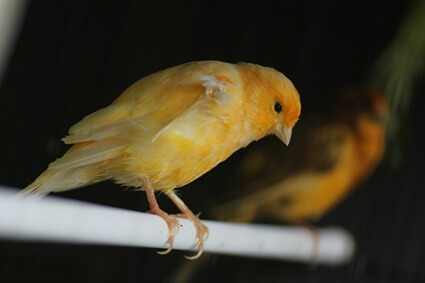
Do Canaries Sing All the Time?
Even the best singing canary breeds don’t sing all the time, and Songbirds tend to sing less during the summer and more during spring.
Canaries molt during the summer, so they need to conserve their energy while the molting period lasts. Although they are bred to sing, it’s still a conscious action and can stop when they want it to.
Male canaries need to sing more during the spring because of the mating season. They also biologically understand that springtime means abundant food and more energy to sing to their heart’s content.
Do All Canaries Sing Beautifully?
Different canary breeds have varying ways of singing. Whether or not you find singing beautiful will depend on you, though. Some canaries have loud, powerful songs that are too intense for any bird owner who isn’t prepared to hear constant whistling in their house.
If you’re a first-time canary owner, you should start with a quiet songbird. If you don’t mind constant loud trilling and high-pitched whistling, there are canary breeds that can satisfy that need.
Take a look at these to understand which of the top canary breeds’ singing you might find most beautiful:
Waterslager
The waterslager tends to sing in choppy notes that are whistled out in rapid succession. This sounds impressive because it resembles a very intense vibrato. However, they tend to be loud, and the tune isn’t very melodic.
German Roller
The German roller also sings in choppy notes but with a lower pitch; sometimes, it sounds like a purring cat. It may also let out long, whiny, single-note whistles.
Because it varies its notes, the German roller’s songs sound slightly more melodic than the waterslager. They also sing more softly, so they are perfect for those that want a quiet songbird.
American Singer
American singers trill continuously but incorporate longer whistles into their songs than German rollers do. They’re notably loud, and first-time canary owners may find their high-pitched singing too much.
Russian Singer
Russian singers whistle more than trill. They sing softly, their melody is varied and interesting, and they aren’t as loud as American singers and waterslagers.
Spanish Timbrado
Spanish timbrados have the most varied songs of the five birds. They whistle, trill, and chirp continuously, changing their pitch as they do. They can get a little loud sometimes, but their unique melody sounds pleasant to most ears.
Gloster
Gloster canaries alternate between trilling and whistling. They are pretty consistent with the melody, so their songs may not sound as interesting to you. They can be loud, but because their melody is so consistent, their song tends to blend into the background.
Yorkshire
Yorkshire canaries love to whistle. Their songs are more varied than the Gloster’s, and they also tend to sing more quietly, and their pitch tends to remain consistent as they sing.
Honorable Mentions
These other canaries are capable of singing beautifully and consistently if trained properly:
- Red factor
- Border canary
- Rubino canary
- Scotch fancy canary
- Crested canary
These canaries may learn to sing beautifully, but it’s not always a guarantee that they can do it as consistently as other breeds. They must be trained from a young age by a master canary trainer.
Master canaries are usually exceptions within a breed. They can sing longer and louder than other birds, so breeders use them for training young canaries in the art of singing. Without a master canary singer, the above breeds are still capable of singing, but only every once in a while.
Why Isn’t My Canary Singing?
If you have a canary that is supposed to sing often but doesn’t, this may be caused by discomfort. Canaries sing to express themselves, especially when they are happy.
Adopting a canary may take time for the bird to get used to its new environment, especially if it has lived in another home for a long time.
The canary will sing once it feels safer. If your canary doesn’t make any sounds, you should take it to the vet to check if there’s anything wrong with its larynx or syrinx.
How Do I Encourage My Canary to Sing?
Canaries are great imitators, so if you want to encourage one to sing, you should play canary sounds. The earlier you start, the faster the canary will learn.
Canaries start learning to imitate other canaries when they’re around three months old. They don’t imitate the songs perfectly at first and aren’t able to sing for very long.
At 8-12 months, they can sing for much longer and more confidently. You should play canary songs daily for a few hours until the canary can sing consistently. The more varied the songs, the more sounds your bird will replicate.

